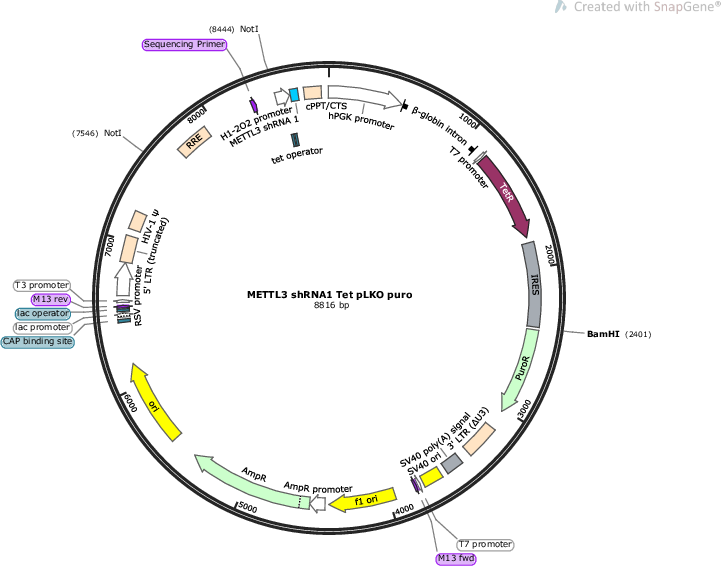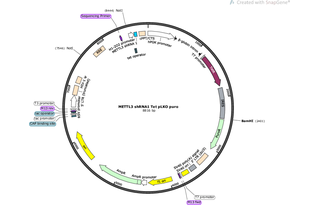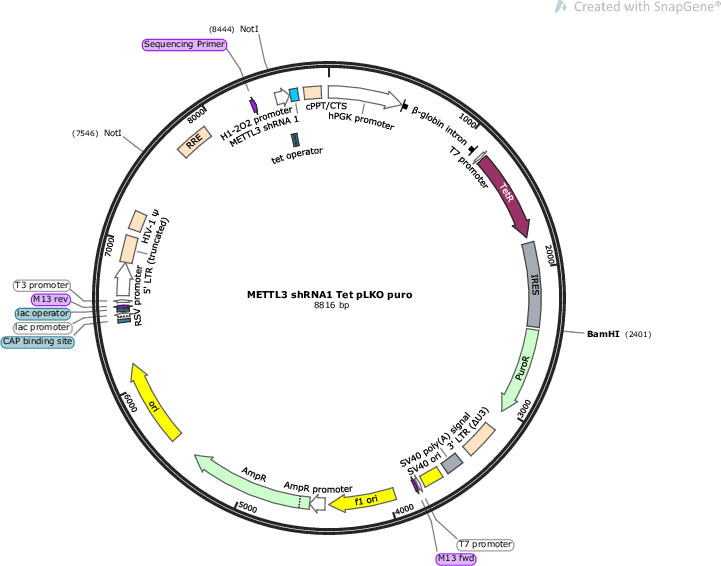-
PurposeTet-inducible shRNA targeting human METTL3 #2
-
Depositing Lab
-
Sequence Information
Ordering
| Item | Catalog # | Description | Quantity | Price (USD) | |
|---|---|---|---|---|---|
| Plasmid | 162984 | Standard format: Plasmid sent in bacteria as agar stab | 1 | $89 | |
Backbone
-
Vector backboneTet-pLKO-puro
- Backbone size w/o insert (bp) 8762
- Total vector size (bp) 8816
-
Vector typeLentiviral
-
Selectable markersPuromycin
Growth in Bacteria
-
Bacterial Resistance(s)Ampicillin, 100 μg/mL
-
Growth Temperature37°C
-
Growth Strain(s)NEB Stable
-
Copy numberLow Copy
Gene/Insert
-
Gene/Insert namemethyltransferase like 3
-
Alt nameMETTL3
-
gRNA/shRNA sequenceGCTGCACTTCAGACGAATTAT
-
SpeciesH. sapiens (human)
-
GenBank IDNM_019852
-
Entrez GeneMETTL3 (a.k.a. IME4, M6A, MT-A70, Spo8, hMETTL3)
Cloning Information
- Cloning method Restriction Enzyme
- 5′ cloning site AgeI (destroyed during cloning)
- 3′ cloning site EcoRI (not destroyed)
- 5′ sequencing primer GGCAGGGATATTCACCATTATCGTTTCAGA
- (Common Sequencing Primers)
Resource Information
-
A portion of this plasmid was derived from a plasmid made byOriginal backbone from Dmitri Wiederschain (Addgene plasmid # 21915)
Terms and Licenses
-
Academic/Nonprofit Terms
-
Industry Terms
- Not Available to Industry
Trademarks:
- Zeocin® is an InvivoGen trademark.
These plasmids were created by your colleagues. Please acknowledge the Principal Investigator, cite the article in which the plasmids were described, and include Addgene in the Materials and Methods of your future publications.
-
For your Materials & Methods section:
METTL3 shRNA 2 tet pLKO puro was a gift from Mark Rubin (Addgene plasmid # 162984 ; http://n2t.net/addgene:162984 ; RRID:Addgene_162984) -
For your References section:
Mapping of m6A and Its Regulatory Targets in Prostate Cancer Reveals a METTL3-low Induction of Therapy Resistance. Cotter KA, Gallon J, Uebersax N, Rubin P, Meyer KD, Piscuoglio S, Jaffrey SR, Rubin MA. Mol Cancer Res. 2021 Jun 4. pii: 1541-7786.MCR-21-0014. doi: 10.1158/1541-7786.MCR-21-0014. 10.1158/1541-7786.MCR-21-0014 PubMed 34088870







